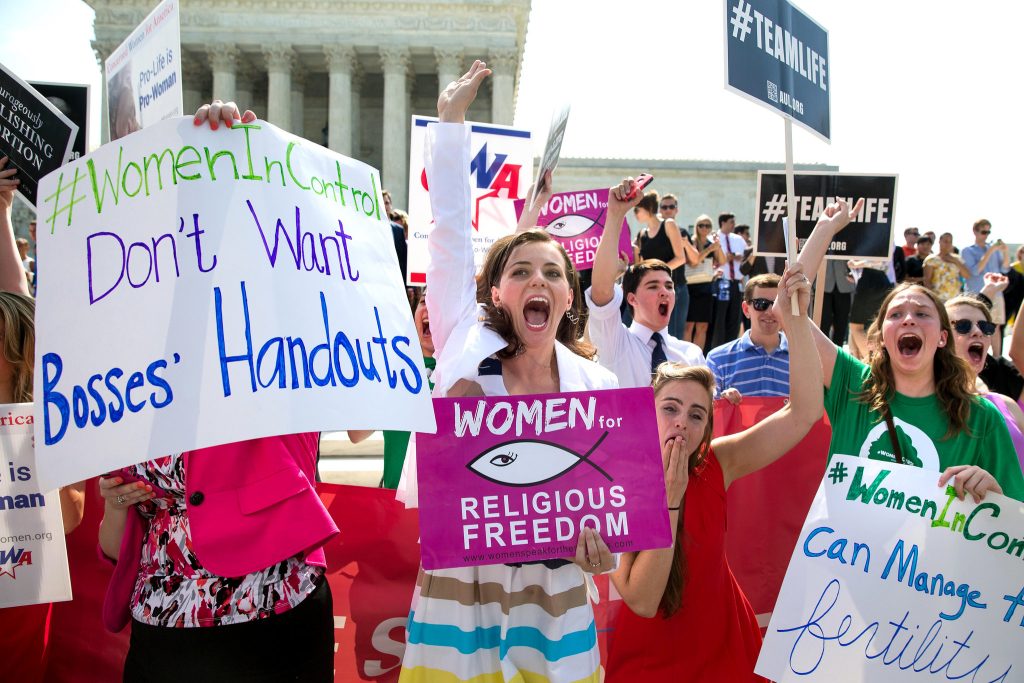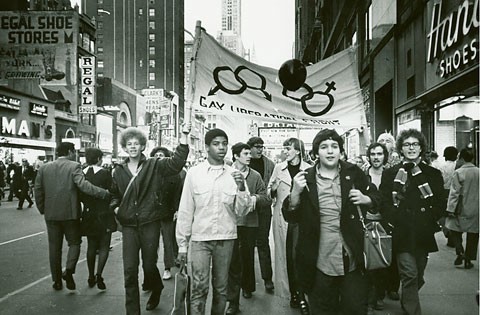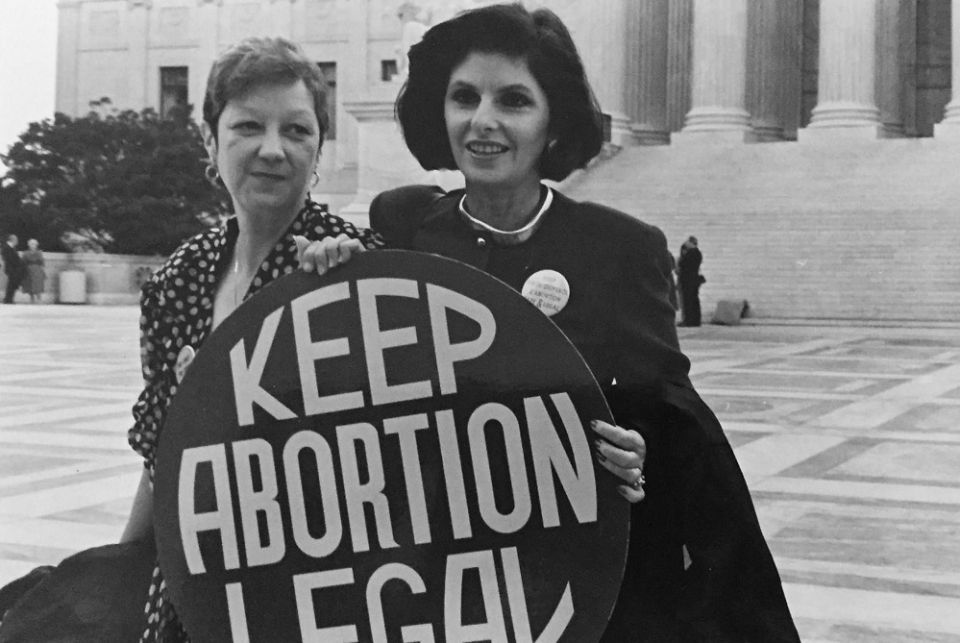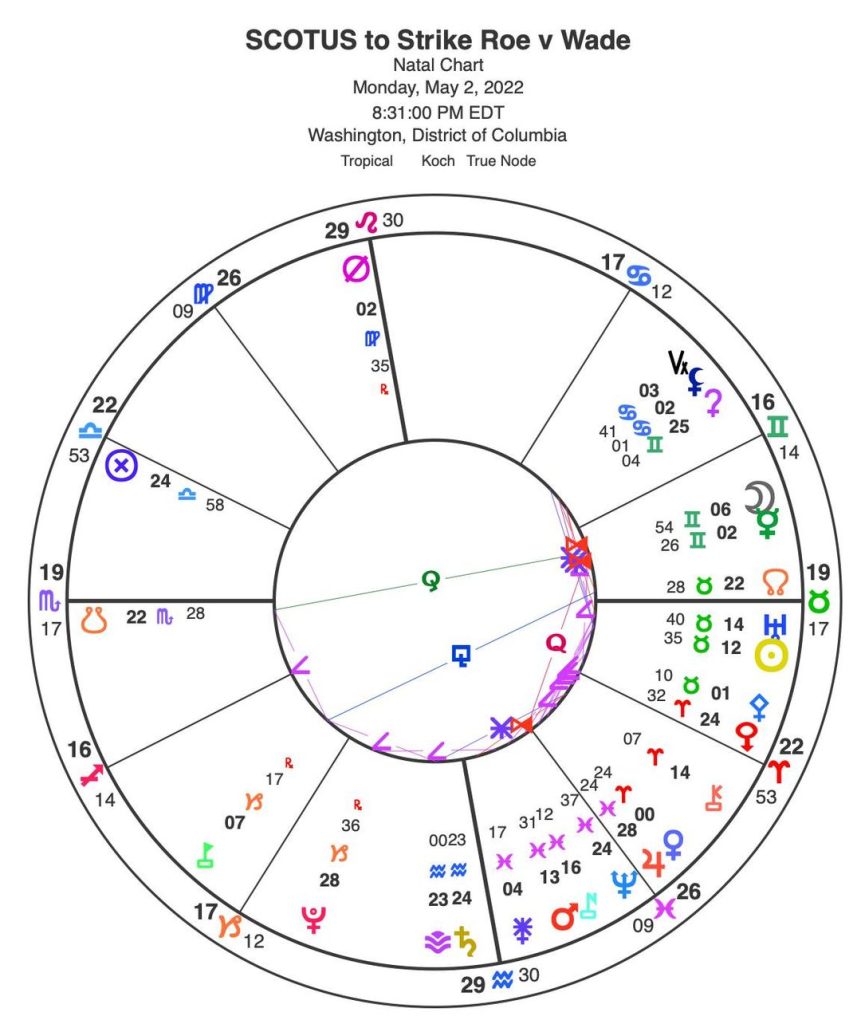In fact when I researched Roe at the 40th anniversary, it was clear that the anti-choice movement was already hard at work, anticipating the decision, and getting ready to take out the pending Equal Rights Amendment (ERA) a few years later.
Dear Friend and Reader:
THE EXTRAORDINARY LEAK of a draft decision of the United States Supreme Court is itself a sign of the times. Yet another thing that’s never happened before actually has. We can be sure that the court staff will face something akin to waterboarding as the justices figure out just how that PDF got loose.Was the ruling leaked intentionally — that is, by the court itself rather than one of its employees going rogue? It may have been — see related article below. Maybe Chief Justice John Roberts will waterboard himself to find out how it got out.

Then there is what the proposed order says: That Roe v. Wade, the decision guaranteeing a woman’s right to abortion, was all wrong from the start, was not based on law, the constitution, custom or legal precedent, and has to go — consequences be damned.
It is important to remember that Dobbs v. Jacobson’s Women’s Health Organization has not been formally decided. The draft, written in February, would presumably result in a decision issued during the court’s June term.
But it is not a good sign; the votes are in, and Chief Justice Roberts assigned the author of the decision reflecting the court’s majority. Close observers have long been expecting this. It is not a surprise.
As the “feminist” movement involved itself for years with men making “inappropriate” remarks in elevators (and picking fights with Handmaid’s Tale author Margaret Atwood), conservatives have worked tirelessly to take down the landmark 1973 Roe v. Wade decision, which guarantees a woman’s right to an abortion.
That effort began before the ink was dry on Roe. In fact when I researched Roe at the 40th anniversary, it was clear that the anti-choice movement was already hard at work, anticipating the decision, and getting ready to take out the pending Equal Rights Amendment (ERA) a few years later.
To my thinking, Roe was the closest thing the United States ever had to an ERA — which was successfully defeated in the early 1980s, largely thanks to the efforts of Caucasian women, who were happy to let men serve in the military. In the absence of true equality under the law, abortion on demand permitted women some of the most important measures of control over their destiny and their relationships.
A teenager being forced to have an illegal back-room abortion, and then being sent to a convent for 10 years (as happened to my Aunt Grace after she was raped by her uncle), is considered myth and folklore.
Many who do not consider themselves conservatives, for example, object to what they describe as a corrupt industry based on processing aborted fetuses. This issue is no longer made up of a strict left-right divide.
Beyond Left Versus Right
In our time, most people feel that a woman should have the right to choose whether she carries a pregnancy to term — about two-thirds favor the right to abortion with some restrictions. A minority favor abortion on demand with no restrictions at all.
Yet I am aware that in our current moment, there are people from a wide diversity of political persuasions who are opposed to abortion. I listen to them, and in my view they are sincere, mostly well-informed and mostly well-intentioned.
Many who do not consider themselves conservatives, for example, object to what they describe as a corrupt industry based on processing aborted fetuses. This issue is no longer made up of a strict left-right divide.
Most young women today have grown up with far greater freedom of choice in all matters than their predecessors of the past 75 years. A teenager being forced to have an illegal back-room abortion, and then being sent to a convent for 10 years (as happened to my Aunt Grace after she was raped by her uncle), is considered myth and folklore. It is for most adults as well. But it happened.
Yet this issue is not merely about abortion. It is not even about women exclusively. It is about the autonomy of all people — men and women — over their own bodies, and to make their own medical choices. This is a concept that it seems only a small minority of people understand.
Will pregnancy become a wholly regulated matter? If so, who will regulate it?

Who Holds Jurisdiction Over the Uterus?
More significantly, the issue is about who holds jurisdiction over the uterus and the woman’s body that surrounds it. Nobody likes abortion, and today very few women use surgical abortion as a routine method of birth control.
We all understand how traumatic it is. But here is what I have been asking for many years: if abortion is illegal, then does every miscarriage become a potential crime scene? [We reported on such a law in 2010.] Will pregnancy become a wholly regulated matter? If so, who will regulate it? What if a woman loses a pregnancy, and her angry husband or boyfriend falsely turns her in for having an abortion? Will she have to prove that she did not? Can she potentially face homicide charges?
Assoc. Justice Samuel Alito, the author of the draft decision that was leaked from the Supreme Court on Monday, does his best to write a tome against abortion that will resound throughout the ages.
There is no judicial restraint in his writing; no effort to show that he truly appreciates the complexities of the situation, or that he is taking a balanced and minimalist view. He does not concede that people, or society, may be harmed, and thus makes no allowances for that potential harm.
However, his most humorous position is that there were never American laws protecting the right to abortion, therefore, the court should throw out Roe — and let the states decide what to do! When he knows exactly what many of them will do. His historical analysis omits the fact that the first women to ever serve in a state legislature Clara Cressingham, Francis Klock and Carrie C. Holly, who were elected to the Colorado House of Representatives in 1894 — long before women could vote.
Alito writes that the Roe decision “was wrong from the start,” and represented an “abuse of judicial authority.” It was “egregiously damaging.”
There Was a Time Before Men Got Involved
He does not make any reference to a time before men got involved in abortion, when all matters of menstruation and pregnancy were adjudicated and addressed exclusively by women, within the red tent.

Rather, he lets it rip, like this was the thing he’s been wanting to write his whole life, and now finally can — like a hometown sports writer covering his team winning the World Series.
“Until the latter part of the 20th century, there was no support in American law for a constitutional right to an abortion. Zero. None,” he writes in a tone more suitable for The New York Post.
I know this is a draft and will probably be toned down. That’s what drafts are for.
“No state constitutional provision recognized such a right. Until a few years before Roe was handed down, no federal or state court recognized such a right.”
Alito writes that the Roe decision “was wrong from the start,” and represented an “abuse of judicial authority.” It was “egregiously damaging.”
And he writes, “Far from bringing about a national settlement of the abortion issue, Roe and [a related decision] Casey have enflamed debate and deepened division.” Does he really think that Supreme Court decisions actually settle the public debate? Does he think that is their purpose? Alito is writing like he is insulated entirely from the real world, living inside a bubble of jurisprudence and ideology.
Within my lifetime, a woman could be prosecuted criminally for using birth control in the privacy of her own home and marriage.

In Our Era, Sex is Political
He is right in one sense: we have never lived in times when all matters of sexuality were automatically political issues. But now that they are, Roe v. Wade recognizes a few significant ideas. One is that a woman has a right to make her own private decisions about her body with her doctor.
For those who oppose “patriarchal” control over a woman’s body, today, she can have a place of refuge. The right to privacy that Roe recognizes runs through a line of Supreme Court decisions, including Griswold v. Connecticut, which assures the right to birth control.

Within my lifetime, a woman could be prosecuted criminally for using birth control in the privacy of her own home and marriage. Under the current draft of Alito’s decision, that would not be affected; the court’s majority is not going after privacy specifically. Yet it is the foundation stone of Roe.
So, too, is the right of the government to supervise what has historically been a risky medical procedure — abortion. We all know the most likely alternative to legal abortion is illegal abortion.
Alito is writing from an “originalist” position: if it’s not in the text, it doesn’t count. He says over and over again that abortion is not mentioned in the constitution. Well, neither is the internet, traffic laws, automatic weapons, or broadcast licenses — but the Supreme Court has ruled on all of them. Should we throw out every ruling on every topic not considered by the constitution?*
In that majority opinion, Justice Byron White reasoned that the constitution did not confer “a fundamental right to engage in homosexual sodomy.”
We Have All Been Here Before
Reading through Alito’s decision this morning, I kept flashing back to another ruling, though I could not quite recall what it was. Alito takes many pages of his text reciting all the places and times that abortion has been shunned and forbidden as a matter of what he thinks is pure morality, which should be upheld by all good and proper people.
Then I remembered where the echo was coming from: it was the 1986 Bowers v. Hardwick ruling, considered one of the most absurd decisions in the court’s history. What was that about? It allowed states to ban all forms of consensual “sodomy,” from anal penetration to oral sex.
In that majority opinion, Justice Byron White reasoned that the constitution did not confer “a fundamental right to engage in homosexual sodomy.”
A concurring opinion by Chief Justice Warren E. Burger cited the “ancient roots” of prohibitions against homosexual sex, quoting William Blackstone’s description of homosexual sex as an “infamous crime against nature,” worse than rape, and “a crime not fit to be named.” (The philosopher Emmanuel Kant said approximately the same thing about masturbation, at around the same time. Perhaps someday the Supreme Court will weigh in on that matter. Who will the opposing parties be? Fingers v. Pussy? Schlong v. Fist?)
The court’s majority is not going to reverse itself because we now know what they are going to do.
Burger’s concurring opinion concluded: “To hold that the act of homosexual sodomy is somehow protected as a fundamental right would be to cast aside millennia of moral teaching.”
The court overturned it an agonizing 17 years later with Lawrence v. Texas.
Will this decision be stopped by its early release? I am doubtful — the positions on the court are so entrenched, and I don’t think the majority wants to give the opinion that their rulings are subject to public debate. The court’s majority is not going to reverse itself because we now know what they are going to do. We may only imagine the consequences, both social and legal — and I need to be on the lookout for the many implications this ruling will have.
Faithfully,

— Additional research: Cindy Tice Ragusa

Chiron Return of Roe: The Astrology of Dobbs v. Jacobson’s Women’s Health Organization
The early release of the decision in Dobbs v. Jacobson’s Women’s Health Organization was reported by the website POLITICO. There are two ways to assess a chart: its immediate moment, and the long-range transit that the planets make to other charts. Both are outstanding.
First and foremost: this chart has Venus — the feminine principle — on the Aries Point. Venus is standing right in the first degree of Aries, which is the intersection between the personal and the collective. This is a fleeting placement, exact for less than a day, and this was the day.

Straight off, the chart passes what is called the “test of radicality”: It reflects the situation. If you read about Roe v. Wade in my earlier coverage, you will see the significance of how the Aries Point comes into the chart for the decision to legalize abortion 49 years ago.
Speaking of Aries: The Dobbs decision is set to come out at the first Chiron return of Roe v. Wade — less than a year short of its 50th anniversary. Anyone who has lived through it can tell you that it is a point of reckoning. (“Covid” was the second Chiron return of what is called “Spanish Flu.” That was special.)
While Chiron can be involved in matters of any topic, its themes are often specifically medical.
Yet with Chiron in Aries, we have two distinct themes that apply. One is that Chiron in Aries has a polarity between tribal rule, and individual autonomy.
Here, abortion is ruled on in the wider context of what the rest of society thinks. This is one of the most important qualities of Aries: it is the intersection of the individual and the collective.
And now Chiron, in many different ways, is highlighting this meeting place. Nearly every issue we see in the news comes back to this idea.
Scorpio says sex and death like no other sign. The lunar nodes streak across the ascendant/descendant axis. This describes public pressure on the situation.
The Immediate Moment
To see what is happening in the immediate moment, we can look at the faster planets, such as the Moon. That will tell us something about the immediate consequences of the release of the decision — and how the public will respond. However, note the position of the Sun — it’s about to form a conjunction to Uranus in Taurus. In a recent article, I described this as being about “the body electric” — which we are taking literally in the form of merging humans with computers. I have a question for my readers: what is the “fetus farm: angle to this story?
Let’s come back the Moon in a moment.
First, the chart has Scorpio rising. Scorpio says sex and death like no other sign. The lunar nodes streak across the ascendant/descendant axis. This describes public pressure on the situation. But there is something odd: the South Node (past-oriented) is in Scorpio. Yet the nodes are what is called “stationary direct,” meaning they can reverse positions.
Is this about me, or is it about we? Is this an individual matter, or a relationship matter? Are we headed toward the future or the past?
The Moon (which represents both the issue, and the public) was in early Gemini at the time the news broke and the world became aware of the decision. The Gemini Moon is caught in a kind of gauntlet. You can see this in the aspects that the Moon has just made, and is about to make.
Neptune in late Pisces will eventually take a square from the Moon in Gemini. This represents a highly confused, deceived and divided public. It also represents the possibility that the draft decision was leaked early, by someone other than an ordinary employee. With the Moon and Neptune in aspect like that, it’s difficult to tell what is real and what is not; who is sincere and who is not.
We would expect to see a massive response from the Woke Left, though I think the feedback will be muted. The issue is too personal, and the left is too anti-sex: to defend abortion is to also defend sexual rights and privileges — worse yet, those of heterosexuals, who today only marginally exist.
Squares of Neptune bring out the denial, delusion and deceit attributes. The public is sleeping through nearly all other things where medical rights are concerned.
An Angry Little Aspect
Before it gets to Neptune, the Moon will make squares to Mars (ascendant ruler, representing desire and sex generally) and Nessus (the consequences of sex, hazy states of consent, and taking ultimate responsibility). This is an angry little aspect pattern. But the anger is directed inwards. It is not likely to be expressed outwards.
Then the Moon passes by Neptune, which seems like anesthesia. It’s the shroud hanging over this whole thing — the mysterious release, and the need to question everything and assess why it is happening now. Squares of Neptune bring out the denial, delusion and deceit attributes. The public is sleeping through nearly all other things where medical rights are concerned. Neptune is famous for the delayed response, or figuring out what happened long after it’s a done deal.
At the end of its trip through Gemini, the Moon forms a square to Jupiter. This is a picture of exaggeration. What will that be about? Will it be the anger, or the anesthesia?
One thing I know: we live in a time when most people feel like these things don’t matter. And for them, that might be true.
_____
*Alito takes other bullshit positions. He spends many pages defending the court’s right to overturn previous decisions, which it does on a fairly regular basis.



